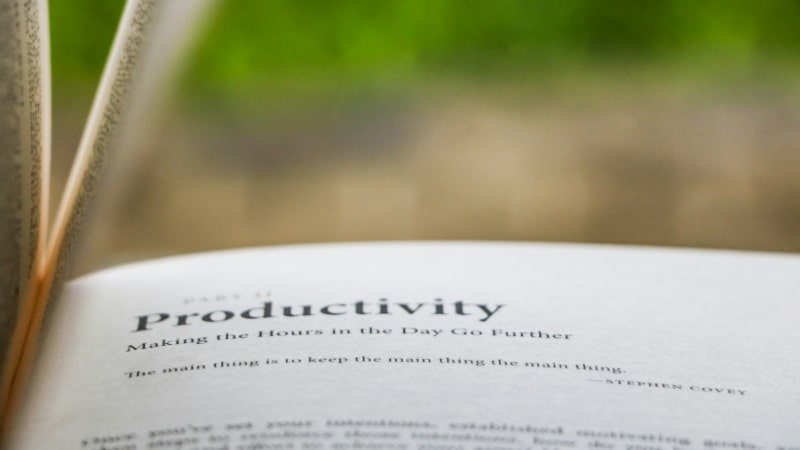Top Productivity Skills to Adopt in Your Workplace & Elevate Performance

Wish your work days weren't so hectic and all over the place? Perhaps it’s time to reevaluate your productivity skills.
We’ve all been there: having too many tasks on our minds and not knowing where to begin, debating which email to answer first (‘cuz dozens of them require immediate attention), getting lost in Slack channels, trying to fight meeting creep… It's exhausting.
No wonder the typical employee is productive only for 60% of the day across all professions. (For office workers, that percentage takes a downturn, as the average office worker is productive for only 2 hours and 23 minutes daily.)
But what’s the underlying issue of poor productivity?
I’d say the lack of understanding that time and energy are not renewable resources. You have to use them wisely if you wish to see positive outcomes.
Moreover, it’s necessary to understand that your skills (or lack thereof) are what contribute to your productivity, efficiency, and, ultimately, a company’s success. Study The human side of productivity suggested that high-skilled employees account for about a third of the workforce in the most productive firms, more than twice as many as in the least productive firms. So, employing a highly skilled workforce is crucial for achieving high firm performance.
But what kind of skills are desirable? The “know-how” ones? Soft skills?
According to the study, the combination of skills varies across sectors, companies, and countries.
But there is a set of skills you can rely on to keep you productive and cultivate deep work.
In this article, we did a deep dive on three crucial productivity skills that can help you accomplish everything you want in 8 hours without feeling overwhelmed or depleted at the end of the workday.
And if you are wondering, “How is it possible to make a difference in productivity with just three skills?”, I say: just trust me and keep reading. 🙂

Definition of productivity skills
Productivity skills are abilities and behaviors you can introduce to your work days to boost your performance and efficiency. They allow you to make the most out of your limited resources一time and energy.
What is so unique about productivity skills in the workplace is that they are not based on the “know-how” and hard skills. They are more related to soft skills and encourage you to think outside the box when imagining the concept of time in a workplace.
Moreover, the importance of productivity skills lies in their transferability. Productivity skills can be “taken” across companies’ teams, projects, departments, etc.
I believe productivity skills are also "contagious’. When one employee excels at managing their time and energy, it sparks curiosity in other team members; they start to wonder about their co-worker's skills and self-management. It's the attitude of gratitude and ease that comes with achieving everything you want in a workday; it becomes so apparent that it makes people wonder why you are so happy. 🙂
Benefits of productivity skills
The only way to understand the benefits of productivity skills is to track their impact.
When it comes to impact, the equation is simple: the better the productivity skills, the higher employee satisfaction.

Studies prove it. According to a McKinsey and Co. study, employee satisfaction is directly correlated with their productivity. Furthermore, employee satisfaction is also connected to:
That being said, what are the three magical productivity skills that significantly impact your performance? Here they are.
1. Time management
2. Consistency
3. Self-preservation
#1 Time management
Scope creep and meeting creep are the project management diseases of our age. That’s why if your role at the company requires you to jump from project to project, it’s almost impossible to get any work done; there’s literally no time.
To tackle this issue, PM pundits suggest tracking time to see where it goes and how it is possible that you can't complete your tasks within the 8-hour work shift.
And they are correct, you should.
But time tracking, for the lack of a better word, is eye-roll worthy.
And we know it too well.
Our CMO, Niclas Preisner, in an article Hate time tracking? So do we. Here's what we did about it, mentioned that the Memtime team was once employed in IT companies, agencies, and law firms where we had to do daily time tracking and hated every bit of it.
Why?
Because tracked time often doesn’t have anything to do with the actual time, as it’s based on estimates and our deeply flawed memory. What’s even worse is that making decisions based on incorrect time data means your company will lose profit.
Time management skills are necessary for growth, whether it’s individual professional growth or a company’s growth.

Incoming: Memtime, the tool.
Memtime is an automated time tracking app that stores all your activity data offline on your computer so that no one but you can see what you’re doing throughout the day. It also:
Time management tips
But enough about time tracking.
Time management is not just about tracking but finding tricks to help you scratch off all those tasks you have in the backlog.
If you ask us at Memtime, time management skills come down to:
- Prioritization techniques and
- Time chunking.
Prioritization techniques
When it comes to prioritization, there are many techniques you can try. The easy-to-remember and fun to try are:
- The MoSCoW technique in which you assign all your tasks in four categories: M (must do) ー have to do tasks, S (should do) ー tasks you should do, C (could do) ー tasks you’d like to do but it’s not the end of world if you don’t and W (won’t do) ー tasks you just won’t be doing.
- The bubble sort technique is the technique where you ask yourself How important is this task compared to the other ones on the list?. To use this method, create a horizontal grid with the tasks next to one another. Go through each task and ask the question. In the end, the most important task will end up in the first place, and the least crucial one will be the last.
- The MIT (Most Important Task) method says you should choose one to three important tasks you must do that day. By doing so, you are ensuring you have your eyes on the three high-priority tasks.
Time chunking

When it comes to time chunking, you already know the drill: it allows you to focus on a task or a group of tasks for a particular period. Here are the basics of time chunking methodology:
- Segment your workday into 30-minute blocks.
- Focus on a task or multiple tasks for 25 minutes.
- Take a 5-minute break after that intense focus.
- Repeat the cycle four times and then take a more substantial 15-minute break.
It's pretty simple to do.
But what makes time chunking so compelling is not its simplicity but the fact that 25 minutes isn't a prolonged time. If you focus on one task for 25 minutes and pause emails and DMs, no one will bat an eye, as all these emails, DMs, and calls don't have to wait long.
Additionally, time chunking has no rules about how you spend your 25-minute sprint; you can complete only one task or dozens of smaller ones一it's up to you.
#2 Consistency
It might seem odd to call consistency a productivity skill, but it is integral to time management. It is the jelly to time management’s peanut butter.
Consistency helps in forming productive habits. When you perform tasks regularly and consistently, they become ingrained in your routine, so that you can complete tasks without significant effort or procrastination.
Focus and concentration
However, to introduce consistency as a productivity skill, you need to understand its two pillars: focus and concentration.

These terms are often used interchangeably. In reality, they have different meanings.
Focus emphasizes intention and prioritization, allowing you to remove all distractions that might interfere with your priorities.
Concentration is the action or what you decide to do with that intention. It suggests processing a task and directing all your energy to tasks aligned with your goals.
Can you have focus without concentration, and vice versa? Of course. For instance, you can focus on a particular task but have your thoughts wander about another issue you need to tackle.
But the best thing is to have both. Being focused and concentrated leads to:
Procrastination
The opposite of consistency is inconsistency or, in productivity lingo, procrastination.
Now, procrastination is a smart enemy that loves to creep into your work and disrupt your routine, leaving you sluggish and guilty for not working. To beat procrastination, you need to develop a routine that optimizes your focus and concentration. Here's how you can do so:
- Have empathy for yourself. Acknowledge and understand your emotions and behaviors without putting yourself down and feeling guilty. Be your own supportive work wife or husband.
- Understand that procrastination is a symptom of a larger issue like fear of failure and being overwhelmed. Instead of being angry at yourself for not completing tasks, support and encourage yourself to understand your feelings first.
- Incorporate consistent productivity habits and routines into your daily schedule. When you have a method of doing something a certain way, you'll eliminate decision fatigue and the need to motivate yourself constantly.
#3 Self-preservation
Self-preservation is a skill that revolves around self-care and balance. It’s there to remind you it’s okay to unwind and stop stressing.
I am sure that you have heard that stress kills productivity. But what it’s also doing is silently killing you: it can negatively impact your physical and mental well-being. That’s why some companies have started offering personal counseling so employees can handle work-related stress. Some even provide 1:1s as a form of discussion on stress and employee mental health.

With all this in mind, it’s essential that you learn how to manage stress. Here are ways you can do so:
To sum up
Accomplishing everything in an 8-hour workday sounds like a mission impossible. But it’s not.
You most likely already have the skills that can improve your productivity; you just have to learn how to use them wisely.
When I feel like I’m losing a battle with productivity, I remind myself of the acronym that captures the essence of being effective and efficient: P.R.O.D.U.C.T.I.V.E. It stands for:
P: Purposeful
R: Results-Oriented
O: Optimized
D: Dedicated
U: Unpretentious
C: Consistent
T: Time-Managed
I: Innovative
V: Value-Driven
E: Efficient
And if you can remember the entire acronym, just remember the “T” part 一 Time-Managed.
When you are intentional with your time, you suddenly start doing valuable things that align with your goals, allowing you to be innovative, creative, consistent, and dedicated.
To help you manage your time, I highly recommend you start with Memtime. Our app runs 24/7 in the background without needing your input, capturing all your activity in programs and browsers.
To see how well Memtime performs, start your 14-day free trial today; no credit card information needed.
Happy time tracking!
Aleksandra Mladenovic
Aleksandra Mladenovic is a copywriter and content writer with six years of experience in B2B SaaS and e-commerce marketing. She's a startup enthusiast specializing in topics ranging from technology and gaming to business and finance. Outside of work, Aleksandra can be found walking barefoot in nature, baking muffins, or jotting down poems.






